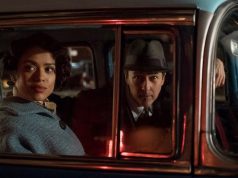My heart goes out to Douglas McGrath. The writer, director and occasional actor was hard at work on “Infamous,” telling the story of how Truman Capote researched “In Cold Blood,” when he learned someone else was making a movie on the same subject. A movie called “Capote.” A movie that would go on to win one Oscar and be nominated for four others, including Best Picture.
Even if “Infamous” turned out to be an outstanding motion picture, it could not possibly compare with “Capote.” Coming out a year later and covering the same material, it would look like a copycat. Worse, the public wouldn’t be interested. One Truman Capote biopic is enough, thank you very much.
So I feel bad for Douglas McGrath that his movie is overshadowed by “Capote.” I feel bad also that even without the comparisons, “Infamous” is not particularly good. Turns out its runner-up status is deserved, regardless of timing.
We begin with an inexplicable scene. It’s 1959, and author/celebrity/bon vivant Truman Capote (Toby Jones) is in a swanky nightclub surrounded by other swanky famous types. The singer is called Kitty Dean, though clearly she is meant to be Peggy Lee. She is played by Gwyneth Paltrow. She sings Cole Porter’s “What Is This Thing Called Love?,” at first enthusiastically and then suddenly having some sort of emotional turmoil in the middle of it. She stops, clearly distressed, falters a moment, then hops back into the song as though nothing ever happened. Paltrow’s performance is riveting. But here’s the thing: The scene has nothing to do with the rest of the movie. The singer’s torment is not explained. She is never seen or referred to again.
My best guess is that the incident foreshadows the inner turmoil Truman will face over the course of the film. The fey, diminutive gay man — often mistaken for a woman, in one of the movie’s running jokes — heads to rural Kansas after a gruesome quadruple homicide there, angling for a story for The New Yorker about how such a grisly crime affects a small town. Accompanied by best friend Nelle Harper Lee (Sandra Bullock), whose “To Kill a Mockingbird” is just being released, Truman becomes friendly with the imprisoned killers, publicly declaring his devotion to the truth while privately rewriting quotations and manipulating facts to make his book spicier.
This is an angle “Capote” didn’t really explore: How much of “In Cold Blood” is accurate and how much is exaggerated? “Infamous” shows Truman recounting his interviews with the killers to his prissy New York socialite pals, reveling in how aghast they are to hear the details, and changing the wording of the murderers’ quotations every time. For the book, he chooses the one that sounds best.
He displays a similarly cavalier attitude toward the facts when he gossips with his friends about other friends. Everybody loves him, but does anyone trust him?
This is an intriguing facet of Truman’s personality, but the irony is that Truman doesn’t seem very conflicted about it. It’s just what he does. There’s certainly nothing to indicate introspection like Paltrow shows in that opening number.
Toby Jones looks enough like Truman Capote, but his voice sounds like an impersonation, not a performance. It’s impossible not to compare: Philip Seymour Hoffman imitated the voice, too, but fleshed out the performance so well that it seemed natural. Hoffman could have not done the voice at all and the character still would have seemed fully realized. With Jones, the voice is all he has.
Far more compelling is the supporting cast, which is impressive in its size and scope. There’s Sigourney Weaver, Hope Davis, Isabella Rossellini, Juliet Stevenson and Peter Bogdanovich, all playing Truman’s wealthy New York friends. Jeff Daniels is endearingly even-keeled as the Kansas sheriff Truman must befriend in order to get access to the killers, and Lee Pace and Daniel Craig are solid as the villains themselves.
The best thing about the movie? Sandra Bullock, believe it or not. Her Harper Lee is intelligent, friendly, full of common sense and gracious manners, instantly likable to all she meets. There are several tantalizing lines about her “next book,” which we all know never came to be; “Mockingbird” was it. Bullock’s warm portrayal of the reclusive author back before she was a recluse makes me think I’d rather be watching a different movie: a biopic of Harper Lee.
C+ (1 hr., 50 min.; )





